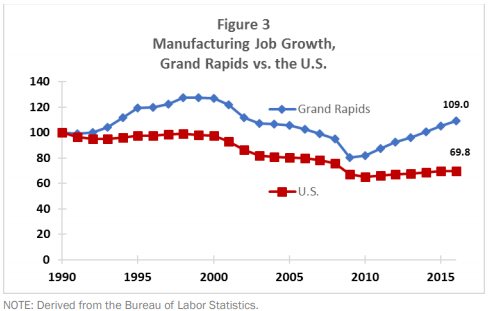Great article by @noamscheiber about Biden team's aim to have a rational national industrial policy. The basic issue: can one come up with overnment policies that will help make the U.S. more competitive in new growth industries, including manuf, as argued for ex by @rodrikdani ? https://twitter.com/noamscheiber/status/1359873891766829065
What would I add to this? Two points, from some areas I know about. First, at the regional level, we can SEE that such industrial policies in some cases work.
For example, as I've covered in a report I wrote for @CenterOnBudget (at request of their then Senior Fellow @econjared46 ), there are clearly cases of older manufacturing communities that have been successful in responding to post-2000 China shock. https://www.cbpp.org/research/full-employment/helping-manufacturing-intensive-communities-what-works
So, although MOST older manufacturing areas have grown slower than the nation, about one-fifth have done significantly better than nation.
Some of these successful areas have "doubled-down" on manufacturing. For ex. , Grand Rapids, Michigan, which has about 2x national share in manufacturing, has shown job growth in manufacturing despite national manufacturing problems.
Although subsidies are part of GR picture, IMO more important role is played by services to business: customized training, & manufacturing extension to help manufacturers move into new markets, for ex auto suppliers moved into medical instruments.
These regional successes point the way to possible national successes, in building up new clusters of higher-wage manufacturers, & building new high-tech industries, either in distressed regions, as I have advocated: https://research.upjohn.org/up_policypapers/24/
Or efforts to create new high-tech areas, as argued by @MarkMuro1 & @RobAtkinsonITIF https://www.brookings.edu/research/growth-centers-how-to-spread-tech-innovation-across-america/
These regional tech strategies can be coupled w/ national strategies to increase overall U.S. publicly-funded R&D, as argued by @jonathangruber1 & @baselinescene in their book, "Jump-Starting America": https://www.jump-startingamerica.com/
And the Gruber/Johnson Jump-Starting book highlights again that really a lot of past U.S. economic growth has been due to government efforts to subsidize R&D to help U.S. competitiveness, as highlighted by @MazzucatoM https://marianamazzucato.com/books/the-entrepreneurial-state
And that is my second point: in addition to local successful industrial policies, we have had nationally successful industrial policies.
For ex., today happens to be "ENIAC Day": the 75th anniversary of the public unveiling of the ENIAC, on Feb. 15, 1946. I know about the ENIAC because my Mom, Jean Jennings Bartik, was one of the first 6 ENIAC programmers, all women. https://www.amazon.com/Pioneer-Programmer-Jennings-Computer-Changed/dp/1612480861
Now there is a huge historical argument about what was the "first" computer, which I don't want to get into. There were secret computer projects during WW2 in UK (Colossus) & Germany (Zuse), as well as a less successful project in Iowa.
But what is clear is that the ENIAC led directly to the development of the modern computer industry.
Now ENIAC began as Army-funded project. Ostensibly, its purpose was to speed up production of ballistics tables. But that was not Army's only goal. They were well aware that this was potentially important tech area that U.S. needed for both its economic & military strength.
So, we can benefit from smart national industrial policies that subsidize research w/ big economic spillovers; & regional policies that provide services to business w/ high benefit-cost ratios. "Industrial policy" is a buzzword in which the devil is in the details.

 Read on Twitter
Read on Twitter



